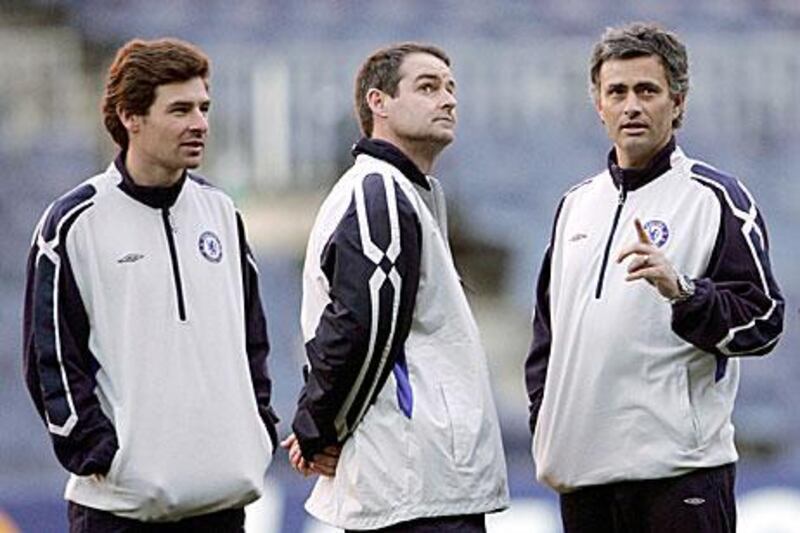Andre Villas-Boas arrives at Chelsea as a break with the past and nostalgia act at the same time, offering continuity in one respect and needing to be revolutionary in another.
Video: Inside The National
Last Updated: June 23, 2011 UAE
The UAE FA wasn't happy with the name which it led it to dissolve the PRO league as officials maintain that everything else remains the same. Also, more from Wimbledon, where Serena gets emotional after her win while Djokovic celebrates his.
[ More on UAE FOOTBALL ]
More Sports news:
UAE ready to wrap up Olympic tie with North Korea Our players are recovered and ready, says coach Ali, as a draw will sufficient against their jet-lagged rivals unaccustomed to high temperatures. Read article
Big spending on teenage talent not always wise for Premier League clubs Read article
While it is tempting to suggest that the estranged but precocious protege of Jose Mourinho, the club's greatest manager, has completed one of the swiftest rises to prominence in managerial history, the demands at Stamford Bridge are such that it will only be rubber-stamped if he captures the desired silverware.
Failure to do so results in a hasty exit, no matter how distinguished the occupant of the dugout, as Carlo Ancelotti can testify.
As Chelsea's seventh manager in eight years, his job description is paradoxical: Villas-Boas is tasked with being both the mini Mourinho and the anti-Mourinho; more attacking, less egotistical, replicating his compatriot's winning habit but without the controversies that hastened the elder Portuguese's exit.
Such are the peculiar politics of Chelsea that his inheritance is both awkward and enviable. His forward line may include his prolific Porto spearhead, Falcao, or the coveted wunderkinds Romelu Lukaku and Neymar; he is definitely bequeathed a £50 million (Dh296m) striker, in Fernando Torres, besides the old firm of Didier Drogba and Nicolas Anelka.
Yet vintage is part of the problem. For Villas-Boas, age cannot be just a number. Like Frank Lampard and Drogba, he is 33.
The youngest manager in Premier League history is at the helm of one of the division's oldest squads. People who in other walks of his life would be contemporaries are his charges and they, like him, are accustomed to being in positions of authority. Player power is more of an issue at Chelsea than anywhere else and Villas-Boas does not have the benefit of the gravitas experience lends.
An assertion of authority may be necessary, and the transfer market is an obvious place to provide it, though the added impediment is that a lack of autonomy when signing has been an issue for some of his predecessors.
Villas-Boas will be responsible, in part, for disbanding Mourinho's Chelsea, the side for whom he scouted in his first spell at Stamford Bridge.
Whereas the 64-year-old Guus Hiddink might have been a glorified caretaker had he been appointed, and thus tempted to preserve the status quo, Villas-Boas has greater reason to be bold. At Porto, he sold two stalwarts of the side, Bruno Alves and Raul Meireles, and rebuilt with such prowess that his first full campaign as a coach resulted in a treble.
As an Anglophile, a former member of Chelsea's back-room staff and the grandson of a Lancastrian, he will be aware that a repeat will be rather more difficult to execute. Marrying transition with trophies is a process that only two clubs - Manchester United and, in their gilded past, Liverpool - have successfully negotiated in English football.
The impatient owner Roman Abramovich's habitual short-termism renders it especially tough at Stamford Bridge while the Premier League's competitiveness means that, no matter how sizeable the cheques signed for reinforcements, teams in the process of reinvention are denied a honeymoon period.
For Villas-Boas, the challenge is particularly pronounced. Change is envisaged in both personnel and approach.
If Chelsea's default formation since Mourinho's arrival has been 4-3-3, the same shape Porto preferred, a similar system does not necessarily indicate a simple switch. While their potent attacking in the 2009/10 season belied the theory Chelsea were defensive, there could be a directness.
Theirs was a style of play that emphasised the towering Drogba's aerial ability and Lampard's excellence at feeding off his flick-ons. As the striker's speed and the midfielder's stamina threaten to decline, an amendment to incorporate a more measured build-up or the brand of quick counter-attacking that enables Torres to flourish may be an option.
So, too, could be the addition of a midfield playmaker, someone that, Deco's brief spell aside, Chelsea have not had in the Abramovich era but one who, in the gifted Joao Moutinho, was pivotal for Porto. The bid for Luka Modric hints at a change of policy.
The new manager's in-tray, therefore, is overflowing: he has to sign and sell, to restyle and reinvent, to command and convince. And, above all, he has to win.






